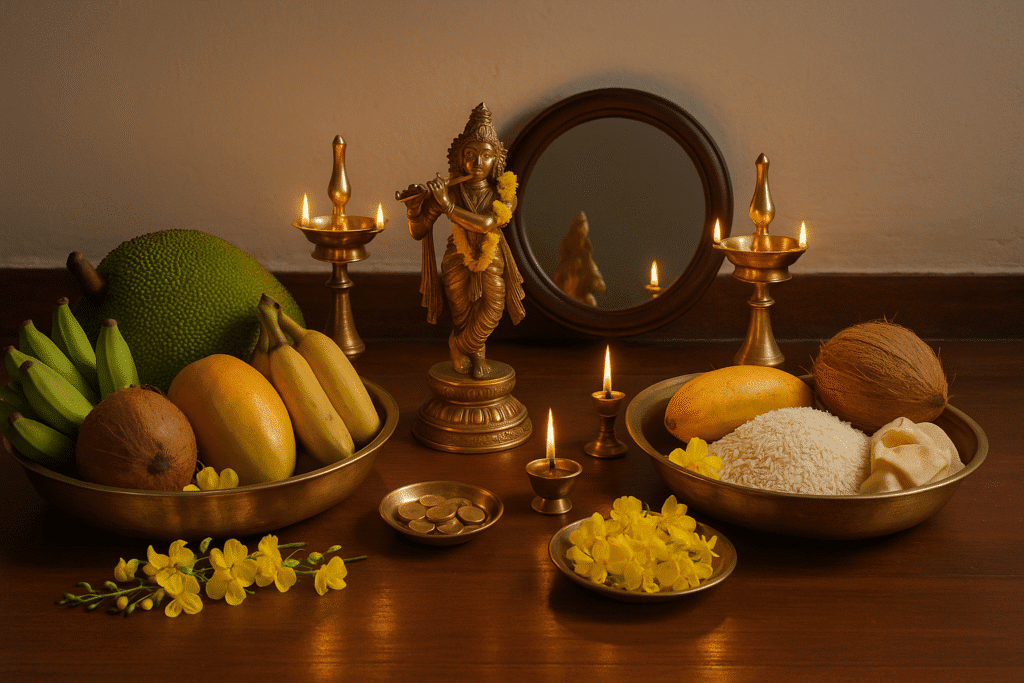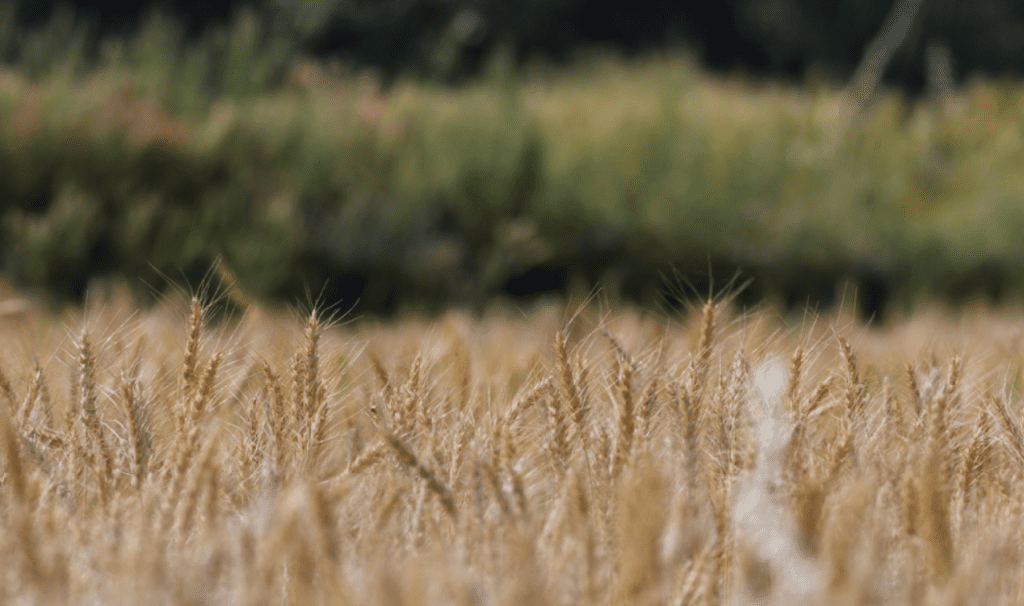Introduction: A Festival of New Beginnings
Vishu, the traditional New Year festival of Kerala, is a vibrant celebration marking the beginning of the Malayalam month of Medam (April). Observed with fervor across Kerala and by the Malayali diaspora worldwide, Vishu heralds the onset of spring, symbolizing prosperity, renewal, and hope. Rooted in the Hindu solar calendar, the festival coincides with the sun’s entry into Aries, aligning with other regional New Year festivals like Baisakhi and Pohela Boishakh. From the iconic Vishukkani ritual to the joyous Vishukkaineetam, Vishu weaves together spirituality, family bonding, and cultural traditions. This article explores the historical significance, rituals, culinary delights, and modern evolution of Vishu, offering a vivid glimpse into Kerala’s cultural heart.
Historical and Cultural Significance
Origins in Agrarian Traditions
Vishu’s origins lie in Kerala’s agrarian past, where the festival marked the start of the agricultural cycle after the spring equinox. Tied to the Hindu solar calendar, it celebrates the sun’s transit into Mesha (Aries), a time of abundance and renewal. Ancient texts like the Vishnu Purana emphasize the worship of Lord Vishnu, who, along with Lord Krishna, is central to Vishu’s spiritual narrative. The festival’s name, derived from the Sanskrit word “Vishuva” (equinox), underscores its celestial roots, blending Vedic astrology with Kerala’s folk traditions.
A Celebration of Prosperity
Vishu is synonymous with prosperity, reflecting Kerala’s lush landscapes and bountiful harvests. The festival’s rituals, such as Vishukkani, are believed to ensure wealth and well-being for the year ahead. Unlike temple-centric festivals, Vishu is deeply familial, with households serving as the focal point for rituals and celebrations. Its universal appeal, cutting across caste and community, makes it a unifying force in Kerala’s diverse cultural tapestry.
Rituals and Traditions: A Spiritual Awakening
Vishukkani: The Auspicious First Sight
The cornerstone of Vishu is the Vishukkani, a meticulously arranged display of auspicious items viewed at dawn on Vishu day, typically April 14 or 15. Prepared the previous night by the eldest woman of the household, the Vishukkani includes a brass uruli filled with rice, golden cucumber, coconut, areca nuts, betel leaves, a mirror, gold coins, and vibrant flowers like kanikkonna (golden shower blooms). Flanked by lit oil lamps and an idol of Lord Krishna, the arrangement is placed before a mirror to reflect abundance. Family members are led blindfolded to view the Vishukkani as their first sight of the day, believed to bring prosperity and good fortune for the year.
Vishukkaineetam: The Gift of Blessings
Another cherished tradition is Vishukkaineetam, where elders distribute money, often coins or cash, to younger family members and dependents. This ritual, performed after viewing the Vishukkani, symbolizes the sharing of wealth and blessings. Accompanied by warm embraces and greetings of “Vishu Ashamsakal” (Happy Vishu), Vishukkaineetam fosters familial bonds and communal goodwill, with children eagerly awaiting their “kaineetam” to spend on sweets or firecrackers.
Temple Visits and Spiritual Offerings
While Vishu is primarily a home-based festival, many visit temples dedicated to Lord Vishnu or Krishna, such as Guruvayur and Sabarimala, to offer prayers. Devotees light lamps and offer rice, fruits, and flowers, seeking divine blessings for the year. Special pujas, like the Vishu Phalam (astrological predictions), are conducted, with priests reading the new Panchangam (almanac) to guide devotees. These rituals blend spirituality with optimism, setting a hopeful tone for the New Year.
Cultural Performances: A Burst of Festivity
Vishu Fireworks and Village Fairs
Vishu is marked by bursts of color and sound, with fireworks lighting up the night sky in rural and urban Kerala. Villages host Vishu melas (fairs), where stalls sell toys, clay pots, and traditional sweets. Folk performances, including Kathakali, Mohiniyattam, and Theyyam, add cultural vibrancy, narrating tales from the Ramayana and Mahabharata. These events, often organized by local temples or community groups, draw crowds, fostering a sense of shared celebration.
Traditional Games and Community Bonding
In rural Kerala, Vishu brings communities together through traditional games like Uri Adi (pot-breaking), Vadamvali (tug-of-war), and Nadan Pattu (folk song competitions). These activities, enjoyed by young and old, strengthen social ties and evoke nostalgia. The laughter and cheers echoing through villages underscore Vishu’s role as a festival of joy and togetherness.
Culinary Delights: A Feast for the Senses
Vishu Sadya: A Grand Feast
No Vishu is complete without the Vishu Sadya, a lavish vegetarian feast served on banana leaves. Comprising over 20 dishes, the sadya features rice with sambar, rasam, avial (mixed vegetable curry), thoran (stir-fried vegetables), and olan (ash gourd in coconut milk). The star of the meal is payasam, a sweet kheer made with jaggery, rice, or vermicelli, often flavored with cardamom and cashews. The sadya’s balance of sweet, sour, and spicy flavors reflects Kerala’s culinary finesse, with families gathering to savor the meal post-Vishukkani.
Vishu Specialties
Beyond the sadya, Vishu features unique dishes like Vishu Kanji, a rice porridge with mung beans and coconut milk, and Mambazha Pulissery, a tangy mango curry. Jackfruit and mangoes, in season during Vishu, appear in erissery and pachadi, adding tropical flair. These dishes, prepared with fresh, local ingredients, celebrate Kerala’s agrarian bounty and reinforce the festival’s focus on abundance.
The Setting: Kerala’s Lush Backdrop
A Festival Amid Nature’s Splendor
Vishu unfolds against Kerala’s verdant landscapes, with coconut groves, paddy fields, and blooming kanikkonna trees setting a picturesque stage. Homes are adorned with kolam (rangoli) made of rice flour and flowers, and doorways are framed with mango leaves, symbolizing prosperity. The early morning air, filled with the scent of jasmine and the glow of oil lamps, creates a serene ambiance for the Vishukkani ritual, grounding the festival in nature’s embrace.
Accessibility and Celebration Hubs
Major Vishu celebrations occur in cities like Thrissur, Kochi, and Thiruvananthapuram, with temples and cultural centers hosting events. Thrissur’s Vadakkumnathan Temple and Kochi’s Paramekkavu Temple draw devotees, while rural areas like Palakkad and Kottayam host vibrant melas. For travelers, Kerala’s well-connected roads and Cochin International Airport make Vishu an accessible cultural experience, with homestays offering immersive stays.
Modern Evolution: A Global Malayali Festival
Vishu Beyond Kerala
Vishu has transcended Kerala’s borders, with Malayali communities celebrating in cities like Bengaluru, Mumbai, Dubai, and London. In 2025, Vishu falls on April 14, and diaspora events are planned in community halls and temples worldwide, featuring Vishukkani displays and sadya feasts. Social media platforms amplify the festival’s reach, with families sharing Vishukkani photos and recipes online, fostering a global Malayali identity.
Adapting Traditions
While Vishu retains its traditional core, modern adaptations include eco-friendly fireworks and digital Vishukkaineetam via mobile apps. Urban families, constrained by space, create compact Vishukkani arrangements, yet preserve the ritual’s sanctity. Community organizations host Vishu cultural programs, blending classical and contemporary performances to engage younger generations, ensuring the festival’s relevance in a fast-changing world.
Vishu in Context: A Solar New Year
A Shared Celestial Celebration
Vishu is part of a broader tapestry of solar New Year festivals across South Asia, including Tamil Puthandu, Assamese Bohag Bihu, and Bengali Pohela Boishakh, all tied to the sun’s entry into Aries. Unlike lunar-based festivals like Ugadi, Vishu’s solar alignment emphasizes its universal appeal. Its focus on familial rituals and prosperity distinguishes it from temple-centric celebrations, highlighting Kerala’s unique cultural ethos.
A Festival of Optimism
Vishu’s emphasis on the “first sight” of abundance sets a positive tone for the year, resonating with universal themes of hope and renewal. The Vishukkani’s mirror, reflecting prosperity, symbolizes self-reflection and optimism, making Vishu a deeply personal yet communal celebration. Its blend of spirituality and festivity appeals to all ages, cementing its place in Kerala’s cultural calendar.
Conclusion: A Beacon of Joy and Prosperity
Vishu is more than a New Year festival; it is a radiant celebration of Kerala’s soul, weaving together faith, family, and festivity. From the serene beauty of the Vishukkani to the joyous bursts of Vishukkaineetam, every ritual pulses with hope and gratitude. As families gather for the sadya and villages come alive with fireworks, Vishu fosters unity and optimism, honoring the land’s bounty and the promise of new beginnings. Whether in a Kerala village or a diaspora community abroad, Vishu’s glow transcends borders, inviting all to embrace prosperity and joy. As the kanikkonna blooms and lamps flicker at dawn, Vishu reminds us to look forward with faith, celebrating life’s endless possibilities.



